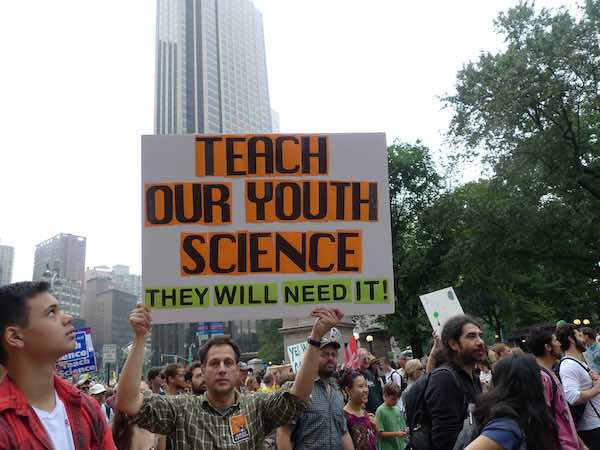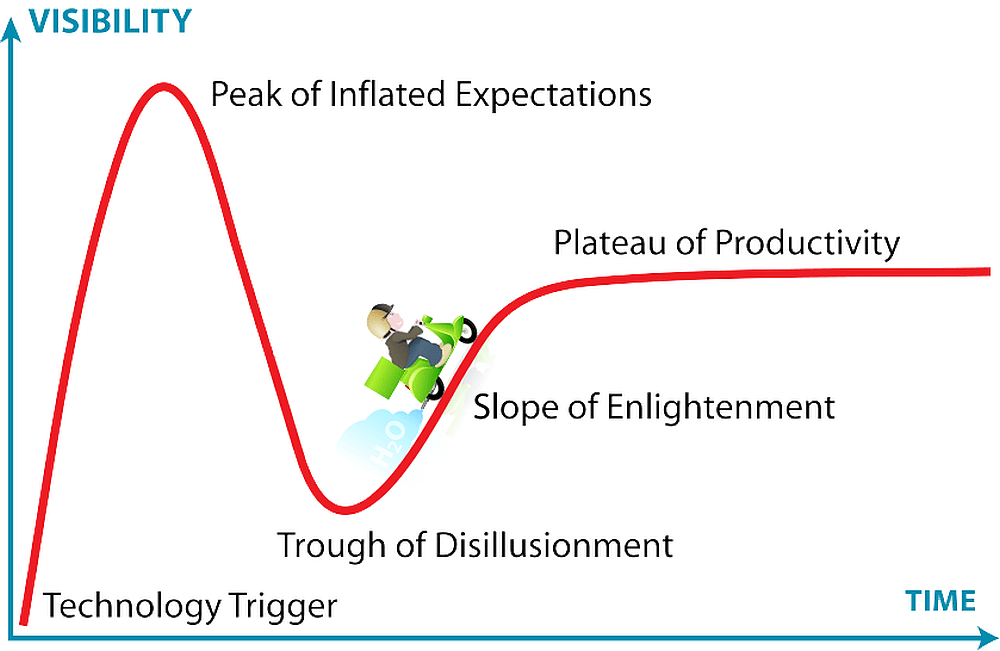
[Image above] Credit: Susan Melkisethian; Flickr CC BY-NC-ND 2.0
Scientists are incredibly willing to put themselves in situations that are utterly unfavorable, all for the sake of science—I know scientists who have taken a facefull of anthrax, gotten up close and personal with decomposing bodies, and been bitten, stung, or otherwise abused by the organisms they’re studying.
And, although it perhaps makes for a less exciting story, many scientists have subjected themselves to years of mental challenges and financial hardship to accomplish their scientific goals (hello, graduate school!).
And yet there’s one area that many scientists and scientific organizations are often reluctant to dive into—politics.
But that may be about to change. Spurred by political dissatisfaction, an unprecedented amount of scientists are deciding to run for office, open dialogues on public policy, or otherwise take activist roles, all mobilization efforts to make a united stand for science.
“I’ve never seen anything like this,” Rush Holt, chief executive of the American Association for the Advancement of Science, says in a Washington Post article. “In the past, there have been marches for one aspect of science or another or for rallies for funding for medical research. … But this was not organized by any interest group. It’s a spontaneous display of concern about science itself.”
Holt’s referring to the March for Science, set for this upcoming Saturday, April 22, in Washington, D.C., and some 400 other cities around the world, in which scientists and science supporters will converge for a rally to display their support for the role of science in society and its place in public policy.
“The March for Science is the first step of a global movement to defend the vital role science plays in our health, safety, economies, and governments,” according to the March for Science website.
Inspired by the Women’s March on Washington earlier this year, and motivated by threats to science as a whole—including budgetary, censorship, data security, and policy concerns—the March for Science aims to make a public stand for science and facts, supporting their vital role in policy.
The grassroots effort has swiftly gained momentum since its conception earlier this year. And in that short time, the March for Science has been endorsed or supported by some 100 groups and even a growing list of companies that are providing fundraising and brand endorsement.
ACerS publishing partner, Wiley, has reaffirmed its commitment to “global interconnectedness, robust independent science, and diversity of all kinds,” and is participating in and supporting the March for Science because it “provides an unprecedented opportunity to draw global attention to the critical importance of science today and in everything that we do.”
The March for Science has been clear to communicate it’s a nonpartisan movement of organizations and individuals, not politicians. The group says it’s advocating for “evidence-based policymaking, science education, research funding, and inclusive and accessible science,” rather than against the current administration.
Hear a bit more about the March for Science’s beginnings, goals, and trajectory in this short video from AAAS’s ScienceInsider.
Credit: Science Magazine; YouTube
Even though the March for Science is a nonpartisan effort, however, the concern for science has been sparked by the actions and policy directions of the Trump administration—starting with scouting out climate change scientists within the Energy Department, and including mandates to government agencies to restrict public communications (which even prompted some national parks to epically and somewhat uncharacteristically go rogue).
Concerns regarding the administration are not restricted to government entities, however. Limitations on travel and entry into the U.S. and perceptions of the administration’s future directions are stifling international scientific collaboration. Some even surmise that the U.S.’s leading role in the scientific world is at risk.
However, according to March for Science honorary co-chair Lydia Villa-Komaroff, although the March was sparked by current administration policies, the March for Science is bigger than just the politics of the Trump administration—it’s a pro-science movement that extends further than the current climate.
In an article on Stat News, she says, “Support for science has been falling for quite some time. And discussions about whether or not science is valid have been going on since long before Trump entered the political scene. These two trends have been building to the point where many of us feel that we need to make the case for science in as nonpartisan a way as possible.”
Science celebrity and activist Bill Nye is another of the March’s other honorary co-chairs and will also attend the central March for Science festivities in Washington, D.C.
According to an article on ScienceInsider, “’We’re building an organization that is going to last beyond the march,’ says Jonathan Berman, a March co-chair and a postdoctoral fellow studying hypertension at the University of Texas Health Science Center in San Antonio. The goal, he says, is to create a group that can help science advocates develop the organizing and lobbying skills they need ‘to make their concerns heard’ and ‘have an effect on politics.’”
Like politics, the movement itself isn’t confined by U.S. borders. At least eight European countries—United Kingdom, France, Germany, Switzerland, Ireland, Norway, Belguim, and the Netherlands—will participate in “solidarity marches” in support of the U.S. event, in addition to Australia and New Zealand. Read some of their international stories here.
And, in true scientist fashion, some March for Science participants are planning on doing more than just taking part—they’re planning to study the scientists participating in the March themselves. ScienceInsider reports that at least four groups plan to conduct surveys of the scientists and science supporters participating in the March for Science to find out more about the political identities and motivations, ultimately examining what their composition and actions indicate about the status of science today.
Are you considering participating in March for Science activities but are worried about potential professional conflicts? Here are some tips for active scientists. And if you’re looking for additional ways to engage in scientific public policy, there are partner organization and monetary donation options with the March for Science. Plus, AAAS has circulated this sign-on draft letter to Congress regarding research funding.
Or you can always run for office.
Author
April Gocha
CTT Categories
- Education
- Market Insights


